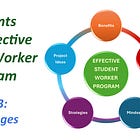MINDSET
While having the right mindset when hiring anyone is important, it is even more so when hiring and supervising student workers. Having the right mindset is arguably one of the most important elements of an effective student worker program. The term “mindset” is used in the context of how a supervisor views, treats, and interacts with their student workers. Having the type of mindset described below can go a long way in creating a positive and rewarding experience for both the student worker and the supervisor. The simplest way to sum up the best mindset a supervisor can have….is to treat and show respect for your student workers just as you would your own staff. View the time spent with your student worker as an investment of your time towards the continuous improvement of your overall programs. The following elements describe the proper mindset to have with an effective student worker program.
Respect – While this has been previously mentioned, the importance of respect in the workplace is worth repeating, especially when supervising student workers. Supervisors and other staff need to be respectful of student workers as valuable members of the team. Too many times students get introduced as “cheap labor”, “a warm body”, or worse...as “the kids”. These student workers have already graduated from high school, they are eligible to vote in elections and serve in the military, they have started attending college in preparation for their professional career….and in some cases, may possess a higher level of skills, energy, and enthusiasm than current staff members. Please be respectful of your student workers….and please do not refer to them as “the kids”…they are student workers or whatever cool job title you came up for them.
When supervisors treat their students like their staff members, including holding them accountable for work performance, their student workers will respond in-kind (or at least high-quality student workers will)….and prove to be valuable team members. Supervisors have a responsibility to ensure that other staff – both internal and external to the department – also show respect for their student workers.
Accountability – In line with the mindset of treating students like staff, student workers also need to be held accountable for work performance. This is even more important if a department is fortunate enough to have multiple student workers. Like permanent staff, if poorly performing student workers are not held accountable, then the poor performance can bring the team down to a lower overall performance level. Alternatively, when student workers are held accountable through processes that are firm but fair, and applied consistently, then supervisors will see a corresponding improvement in student worker performance. Supervisors can attract and retain high-quality staff and student workers by maintaining accountabilities for all team members.
Key strategies for improving accountability include:
Commit to regular and standing, one-to-one meetings.
Provide thorough On-The-Job training.
Provide program documentation such as standard operating procedures, etc.
Provide clear written expectations via job description, project assignments, meeting minutes, etc.
Use the same processes and procedures that would be implemented for staff members, including disciplinary action as applicable.
Flexibility – While having a mindset of accountability is important, it is equally as important, especially when dealing with student workers, for supervisors to maintain flexibility. Given the nature of the primary reason the student is attending college, supervisors do need to remain flexible, particularly around scheduling. Student worker schedules and commitments can change each semester and several times during a semester. Supervisors of student workers need to collaborate closely with their student workers, particularly as it relates to scheduling. This includes being understanding during times of academic stress such as exams and report deadlines.
Similarly, supervisors and students should ensure they are aligned on what will occur during academic breaks during the semester. Some student workers will very much appreciate extra work hours, while some student workers will choose to actually…take a break from work and classes. Supervisors are wise to include these discussions as part of regularly scheduled meetings with the student worker. Student workers greatly appreciate supervisors who are understanding and flexible. However, both supervisor and student worker need to remain flexible and keep good lines of communication open.
High-quality student workers will keep their supervisors informed well in advance of any confirmed or possible scheduling changes so accommodation can be made. As stated before, simple pre-planning and good communication can help prevent problems from occurring. Where possible, supervisors appreciate high-quality student workers who remain flexible when scheduling their classes and other activities around work schedules.
Customer Feedback – Supervisors should view their student worker as an excellent source for customer feedback. As the student worker continues to get more engaged in their job, it is only natural they will be talking to their friends and other people about it. Considering the student worker will have classmates, friends, and know various faculty and staff across the campus, they will unquestionably be provided feedback by these individuals. As such, the student worker can serve as a conduit for customer feedback, as well as providing ideas for program development and implementation. This is especially true when a supervisor has a trusting and respectful relationship with their student worker.
Student workers can be invaluable resources for helping to identify both new and currently used technologies that are being used for communications and productivity applications. Similarly, student workers are excellent sounding boards to discuss roll out strategies and for program development and engagement. Supervisors need to keep the mindset that their student workers can provide valuable feedback from the perspective of a campus customer.
Referrals – Developing an effective student worker program will greatly benefit current and future student workers by creating a positive and rewarding work experience. Even though student workers are typically short-term employees who leave after graduation, they can be great sources of referrals for other high-quality student workers for future hires.
If a supervisor hires a high-quality student worker and cultivates the growth of that young professional, then overall team productivity will be enhanced. It is common sense that a high-quality student worker who has a rewarding work experience will let their friends, classmates, and other people know about their position. This is especially true if the supervisor supported resume building activities for their student worker.
As such, the impact of student worker referrals should not be underestimated by the supervisor of those student workers. Through implementation of an effective student worker program, the quality and quantity of potential student worker should increase…and this in large part…will be supported through word-of-mouth referrals by former high-quality student workers.
Future Resources – Supervisors should keep in mind and appreciate the potential future resources their current student worker could become someday. There are numerous examples of student workers transitioning into full-time positions within the same departments after they graduate. There are also plenty of examples where student positions helped justify the need for the creation of part-time and full-time staff positions. Supervisors are wise to train their student workers as if they were going to become future staff members.
Student workers appreciate and should be encouraged to participate in volunteer activities and gain experience attending professional conferences and events. This is both for their own professional growth and development and to start integrating them into professional organizations. Through this positive exposure, student workers can serve as volunteers at these events and begin their path to become future leaders within their profession. By facilitating participation in these events, supervisors are also sowing the seeds for future volunteer positions and committee assignments after the student worker graduates and enters the profession as a full-time employee. Supervisors who encourage and support these activities are in essence laying the foundation for a long-term professional relationship, in which both the supervisor and former student worker can continue to support and serve as resources for each other.
At the end of the day, the best mindset supervisors should keep when dealing with student workers is simply to treat them as one of their own staff. It is also very important for a supervisor to have the mindset that time spent working with their student worker is an investment of their time. An investment of time as part of continuous improvement within the supervisor’s programs. There are several strategies and project ideas supervisors can implement to create an effective student worker program to achieve and convey this mindset. Having the right mindset will lead to a more productive and rewarding experience for both the supervisor and the student worker.















